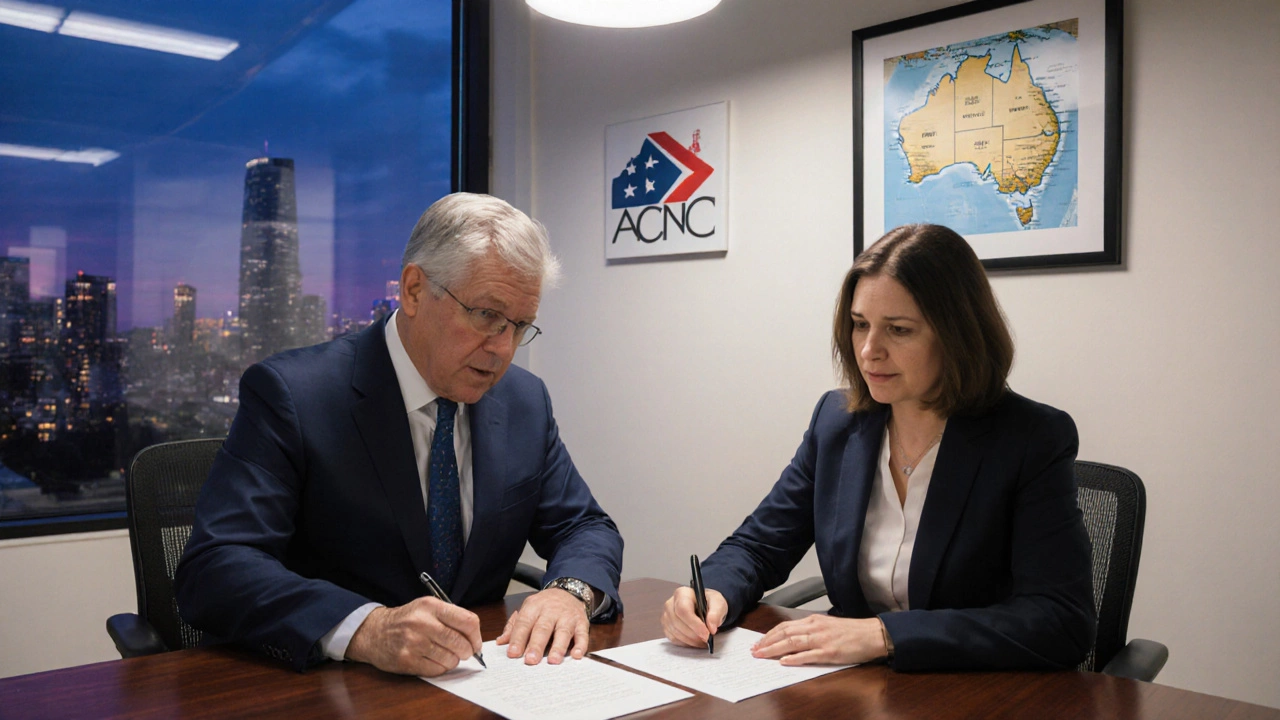Creating a Charitable Trust in Australia: Is It Right for You?
 Oct, 8 2025
Oct, 8 2025
Charitable Trust Decision Checker
Assessment Criteria
Answer the following questions to get personalized guidance on whether a charitable trust suits your needs.
Your Assessment Result
Thinking about turning your desire to give into a lasting legacy? A charitable trust is a legal arrangement where assets are managed for a charitable purpose, usually overseen by a trustee or a board can seem like the perfect vehicle. But before you sign any paperwork, you need to know what it really involves, how it differs from other giving options, and whether the benefits outweigh the costs for your situation.
What Exactly Is a Charitable Trust?
A charitable trust is a type of trust created under Australian trust law to hold and manage assets for charitable objectives defined in its deed. Unlike a personal will, a trust exists while the assets remain invested, generating income that can be used to fund charitable activities long after the founder’s death. The trust is usually managed by a trustee an individual or corporate body responsible for administering the trust in line with its purpose and legal duties, and it must have at least one beneficiary a person, organization, or cause that receives the benefit of the trust’s distributions. In many cases the beneficiaries are defined broadly - for example “any certified Australian non‑profit working in youth mental health”.
Key Benefits of a Charitable Trust
- Long‑term impact: Assets stay invested, creating a perpetual source of funding.
- Tax advantages: The Australian Taxation Office (ATO) allows income tax exemptions on the trust’s earnings and provides donors with tax deductions for contributions.
- Control over purpose: You set the charitable objectives, ensuring the money is spent the way you intend.
- Estate planning benefits: A trust can reduce probate fees and keep the assets out of your estate.
- Family involvement: Trustees can include family members, turning philanthropy into a shared family value.
Potential Drawbacks and Risks
- Setup and ongoing costs: Legal fees, registration, and annual compliance (financial statements, audit) can add up.
- Complex administration: Trustees must understand fiduciary duties, reporting to the ATO, and the Charities Register requirements.
- Funding requirements: To keep the trust tax‑exempt, the ATO expects a minimum level of charitable activity each year.
- Asset liquidity: Once assets are locked in a trust, they can’t be easily redirected without amending the trust deed.
- Potential scrutiny: Charitable trusts are subject to public transparency; donors must be comfortable with that level of visibility.

How to Set Up a Charitable Trust in Australia
- Define your charitable purpose: Be specific (e.g., “supporting under‑privileged youth in Melbourne through education scholarships”).
- Choose the trust type: Most founders use a “discretionary charitable trust” where trustees decide how to allocate funds.
- Draft the trust deed: Engage a solicitor experienced in trust law. The deed must include purpose, trustee powers, beneficiary definition, and termination clause.
- Appoint trustees: You can appoint yourself, family members, a corporate trustee, or a professional trustee service.
- Fund the trust: Transfer cash, shares, property, or other assets. Be aware of any stamp duties or capital gains tax that may arise.
- Register with the ATO: Apply for a Tax File Number (TFN) and request a tax exemption under section 13/15‑5 of the Income Tax Assessment Act.
- Apply to the Australian Charities and Not‑for‑profits Commission (ACNC): To be recognised as a registered charity, you need to meet the public benefit test and submit a Charitable Purpose Statement.
- Set up a bank account: Use the trust’s TFN and ABN for transactions.
- Establish governance procedures: Draft minutes, conflict‑of‑interest policies, and an investment strategy.
- Maintain compliance: File annual financial statements with the ACNC, lodge tax returns (if required), and keep detailed records of distributions.
Alternative Giving Structures - Quick Comparison
| Feature | Charitable Trust | Private Foundation (Australian equivalent) | Direct Donation |
|---|---|---|---|
| Legal form | Trust deed under Trusts Act | Company limited by guarantee | One‑off gift to an existing charity |
| Control | Trustees decide allocations | Board of directors with statutory duties | No ongoing control after donation |
| Tax deduction for donor | Yes, up to 100% of contribution | Yes, similar rules | Yes, immediate deduction |
| Ongoing administrative cost | Medium‑high (trustee fees, audit) | High (company reporting, governance) | Low (just receipt acknowledgement) |
| Longevity of funding | Perpetual if assets are preserved | Perpetual, but requires endowment management | One‑time impact only |
| Regulatory body | ATO + ACNC | ATO + ACNC + ASIC | ATO (recipient charity) |
Tax Implications and Ongoing Compliance
When you register the trust with the ATO, you can apply for two key tax concessions:
- Income tax exemption: The trust’s earnings (interest, dividends, rent) are generally tax‑free, provided the income is used for a charitable purpose.
- Deductible Gift Recipient (DGR) status: Contributions to the trust become tax‑deductible for donors, encouraging more giving.
However, you must keep the trust’s activities aligned with its charitable purpose. The ACNC monitors annual returns and may withdraw registration if the trust fails to meet the public benefit test.
Another nuance: if the trust distributes income to individuals (rather than charities), the distributions may be subject to personal income tax, and the trust could lose its exemption. That’s why many founders keep the trust’s beneficiaries strictly defined as registered charities.
Decision Checklist - Is a Charitable Trust Right for You?
- Do you have a sizable pool of assets (cash, shares, property) you want to preserve for future giving?
- Is long‑term impact more important to you than an immediate, one‑off donation?
- Are you comfortable with the administrative workload or can you hire a professional trustee service?
- Do you want to involve family members in governance and philanthropy?
- Will the tax deductions and potential estate‑planning benefits offset the setup costs?
If you answered “yes” to most of these, a charitable trust is worth serious consideration. If the answers lean toward “no”, a direct donation or a simpler donor‑advised fund might be a better fit.
Next Steps and Common Pitfalls
Once you decide to move forward, start by consulting a solicitor who specialises in trusts and a qualified accountant familiar with the ATO’s charitable rules. Draft a clear, concise deed - vague language can cause compliance headaches later.
Watch out for these common traps:
- Under‑funding the trust: If the investment returns can’t cover the charitable distributions, the trust may fail the public benefit test.
- Choosing unqualified trustees: Trustees must act in the trust’s best interest; conflicts of interest can lead to legal penalties.
- Neglecting annual reporting: Missing an ACNC lodgment or ATO filing can trigger fines and loss of tax-exempt status.
- Ignoring investment policy: A sound investment strategy helps preserve capital and grow the endowment.
By staying proactive and keeping good records, you’ll set up a vehicle that can keep giving for generations.
Frequently Asked Questions
Can I set up a charitable trust with just a few thousand dollars?
While there’s no legal minimum, a very small fund may struggle to meet the ATO’s public‑benefit threshold and cover ongoing admin costs. Most advisors recommend at least $50,000 to make the trust viable.
Do I need a professional trustee, or can family members act as trustees?
Both options are allowed. Family trustees can keep the trust’s mission close to your values, but you must ensure they understand fiduciary duties. Many founders hire a corporate trustee for expertise and to reduce personal liability.
How does a charitable trust differ from a donor‑advised fund?
A donor‑advised fund is managed by a financial institution; you advise on grants but don’t own the assets. A charitable trust gives you direct control over assets and governance, but comes with more paperwork.
Will contributions to my trust reduce my taxable income?
Yes, if the trust has DGR status. You can claim a tax deduction for the amount donated, subject to the usual caps (generally up to 100% of your assessable income).
What ongoing reporting is required?
You must lodge an annual financial report with the ACNC, submit a tax return (if required), keep a register of beneficiaries, and maintain proper minutes of trustee meetings. Audits may be required if the trust’s revenue exceeds $250,000.